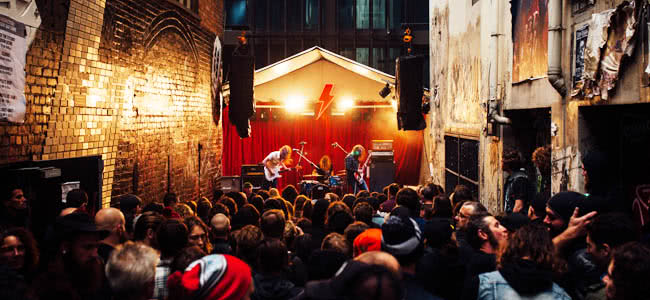It’s not like we needed any more proof that Melbourne is one of the world’s leading music cities, but a new white paper released in association with the recent Midem music industry conference has done that math and made it a scientific fact for us.
Midem is like the global BIGSOUND, drawing music industry professionals from around the world, who all congregate in Cannes to schmooze and discuss all the pertinent issues that are currently facing the industry and how to tackle them.
The study, entitled The Mastering Of A Music City, was published by the IFPI and Music Canada in association with Midem and cites Melbourne as one of the primary hubs for music, particularly live music, in the world.
Alongside London, Montreal, New York, Berlin, Nashville, and Austin, Melbourne is held up as an example of what a music city should look like and how it should function. In fact, Melbourne gets mentioned a total of 38 times in the study.
“In Melbourne, Australia, a 2012 census found that live music alone generated more than A$1bn in spending at small venues, concerts and festivals, supported 116,000 annual full-time equivalent jobs, and produced significant spin-off benefits to restaurants, hotels, transportation companies and other providers,” the study reads.
Researchers praised factors like the city’s groundbreaking Agent of Change laws. “In 2009-2010, an estimated 5.4mn people attended live music performances in the city. This puts music in the top ranks of the city’s economic drivers,” the study reads.
“The Agent of Change Principle works well where there is a concentration of established music venues that are threatened by encroaching residential developments. An effort is now underway to have this principle adopted in part of London, UK.”
[include_post id=”480363″]
Government policies that are mindful of the arts and musicians were one of seven strategic areas the study cites as contributing to a strong and vibrant music economy, as well as community engagement and support for music advisory boards, such as Music Victoria.
“A vibrant music sector delivers an extensive array of social, cultural and economic benefits to its community; from job creation and retention to city identity and music tourism, to social cohesion, music can play an essential role,” said Music Canada CEO Graham Henderson.
The Agent of Change laws are used as a case study in the report and Melbourne is generally hailed as the model for what a music city should be. Like we said, you didn’t need any more proof of that, but it’s nice to know.




































